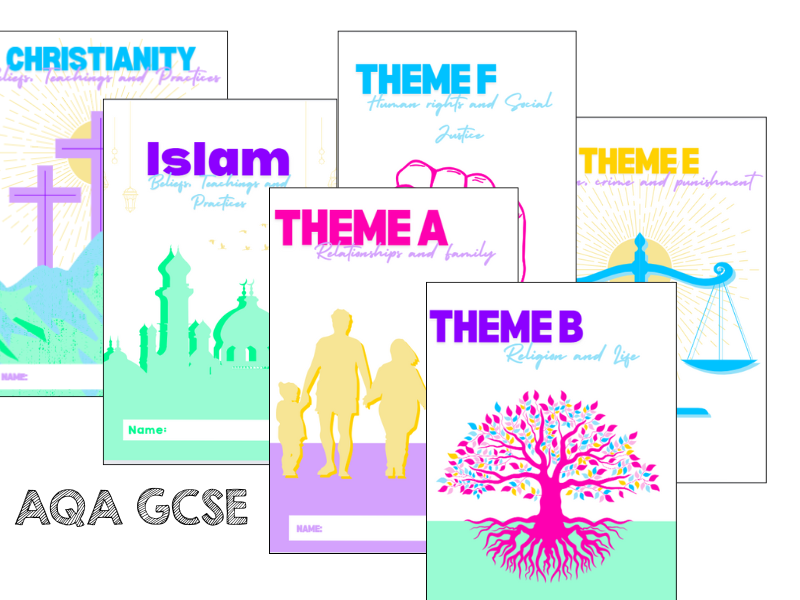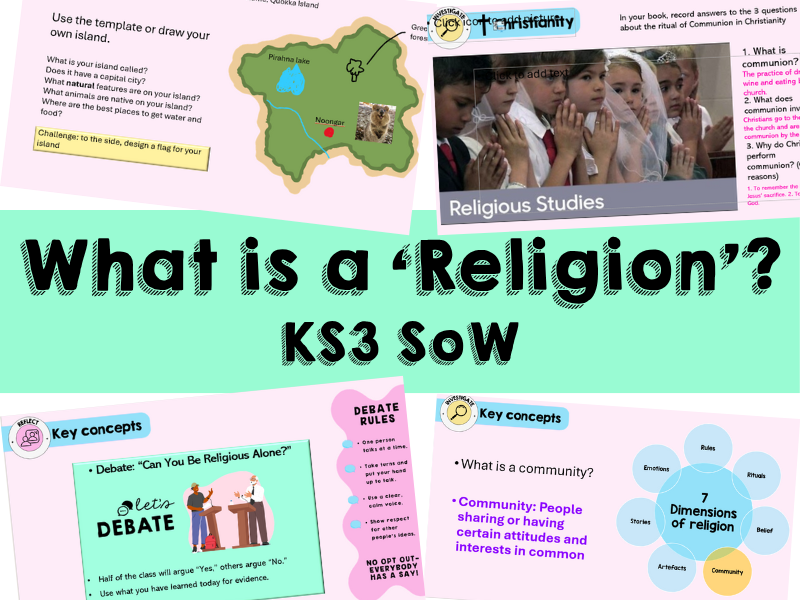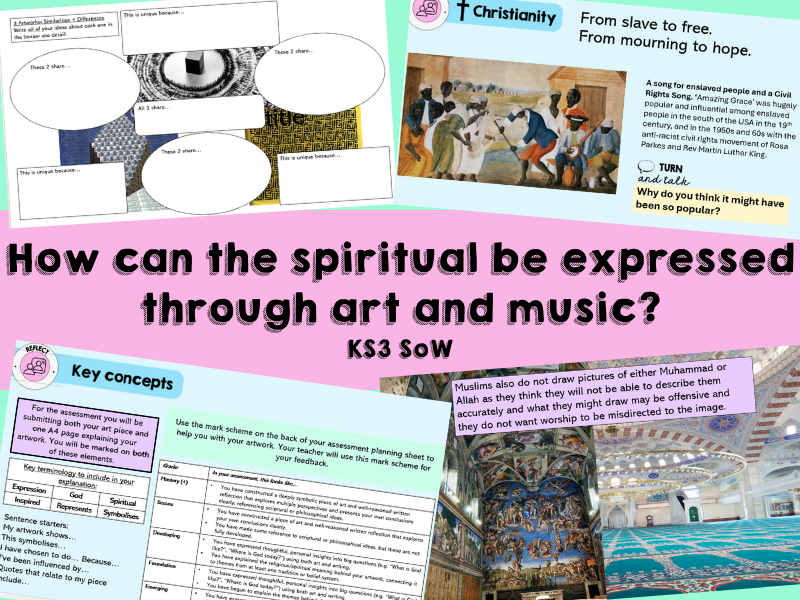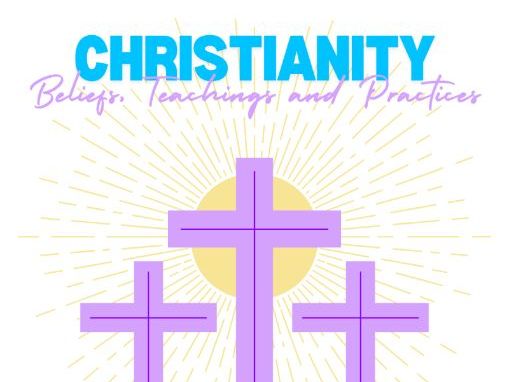26Uploads
665Views
65Downloads
Featured resources

GCSE Resurrection Structure Strip
Structure strip to help students start writing 12-markers for GCSE RS. Cut out the strip and complete the essay or notes next to the strip in their books/on paper.
Easy to convert to other essay questions where needed!

Religious Studies artifact game
Sheets to use alongside commonplace school religious artifacts from the big 6 religions, can be used for events such as open day or taster sessions.
Intended to provoke discussion and engagement.
Have fun!

Oracy in Religious Studies Display
A colourful and informative interactive display for religious studies classrooms. Includes 4 steps to effective debating and oracy definitions. Use the strips to create pouches of quick sentence stems and debating topics for students to take during oracy lessons.

Form/Tutor Display
Full tutor or form colourful display including âwelcome toâŚâ bunting, balloons for displaying birthdays, star of the week and notices.

Can religion help people to be good? (SoW)
Full scheme of work including powerpoints and accompanying resources, investigating religion as an important source for morality. Includes plenty of oracy opportunities, group work and a full assessment/feedback cycle. Best for use with Y8/9.

Philosopher Hats Game
The Philosopherâs Hat Game
Objective: Explore different philosophical viewpoints.
How to Play:
Participants choose a hat and must argue a viewpoint from that philosopherâs perspective on a given issue.
Encourage creative interpretations and lively discussions.
Great as an A Level lesson, for philosophy clubs, or open days.

GCSE Theme E Handbook
(5 of 6) AQA GCSE Theme E Handbook â Crime and Punishment
This comprehensive handbook is designed to support students in mastering the AQA GCSE Religious Studies (Themes) specification.
Inside, youâll find:
⢠List of AQA-mandated key vocabulary with space for students to write in definitions.
⢠Step-by-step exam guidance for 4, 6, and 12 mark questions, including sample structures and sentence starters.
⢠Concise summaries of each area of study in Theme E.
⢠Key scripture references and religious teachings mapped to each topic.
⢠Topic-specific knowledge organisers, covering core concepts (aims of punishment, death penalty, etc.) and arguments (Christianity and Islam).
⢠Balanced viewpoints presented in outline form, helping students prepare for evaluative exam questions.
⢠RAG rating section of the AQA specification for the topic.
This booklet is perfect as a revision tool or quick reference guideâideal for last-minute study, lesson support, or building exam confidence.
Best suited for:
â GCSE Religious Studies (AQA) students who need clear, structured notes
â Teachers seeking classroom-ready knowledge organisers
â Learners who prefer concise overviews instead of long explanations
(The question guidance has been adapted from a school document that I found online- I canât remember who it was but if it is you message me for credit!)

GCSE Theme B Handbook
(4 of 6) AQA GCSE Theme B Handbook â Religion and Life
This comprehensive handbook is designed to support students in mastering the AQA GCSE Religious Studies (Themes) specification.
Inside, youâll find:
⢠List of AQA-mandated key vocabulary with space for students to write in definitions.
⢠Step-by-step exam guidance for 4, 6, and 12 mark questions, including sample structures and sentence starters.
⢠Concise summaries of each area of study in Theme B.
⢠Key scripture references and religious teachings mapped to each topic.
⢠Topic-specific knowledge organisers, covering core concepts (environment, abortion, euthanasia etc.) and arguments (Christianity and Islam).
⢠Balanced viewpoints presented in outline form, helping students prepare for evaluative exam questions.
⢠RAG rating section of the AQA specification for the topic.
This booklet is perfect as a revision tool or quick reference guideâideal for last-minute study, lesson support, or building exam confidence.
Best suited for:
â GCSE Religious Studies (AQA) students who need clear, structured notes
â Teachers seeking classroom-ready knowledge organisers
â Learners who prefer concise overviews instead of long explanations
(The question guidance has been adapted from a school document that I found online- I canât remember who it was but if it is you message me for credit!)

GCSE Theme A Handbook
(3 of 6) AQA GCSE Theme A Handbook â Relationships and Families
This comprehensive handbook is designed to support students in mastering the AQA GCSE Religious Studies (Themes) specification.
Inside, youâll find:
⢠List of AQA-mandated key vocabulary with space for students to write in definitions.
⢠Step-by-step exam guidance for 4, 6, and 12 mark questions, including sample structures and sentence starters.
⢠Concise summaries of each area of study in Theme A.
⢠Key scripture references and religious teachings mapped to each topic.
⢠Topic-specific knowledge organisers, covering core concepts (marriage, divorce, homosexuality) and arguments (Christianity and Islam).
⢠Balanced viewpoints presented in outline form, helping students prepare for evaluative exam questions.
⢠RAG rating section of the AQA specification for the topic.
This booklet is perfect as a revision tool or quick reference guideâideal for last-minute study, lesson support, or building exam confidence.
Best suited for:
â GCSE Religious Studies (AQA) students who need clear, structured notes
â Teachers seeking classroom-ready knowledge organisers
â Learners who prefer concise overviews instead of long explanations
(The question guidance has been adapted from a school document that I found online- I canât remember who it was but if it is you message me for credit!)

KS3 RE â âWhat is Religion?â Scheme Plan
KS3 RE â âWhat is Religion?â
Engaging, detailed plan for an 8-lesson KS3 Religious Education unit exploring the core question: âWhat is a religion?â
This dynamic and thought-provoking scheme introduces Year 7 students to the nature of religion through philosophical, theological, and sociological enquiry. Rooted in Ninian Smartâs âSeven Dimensions of Religionâ, the unit enables students to investigate worldviews (religious and non-religious) while developing their understanding of belief, community, stories, rules, and rituals. Students throughout the scheme build their own desert island âreligionâ, applying their knowledge to a creative example.
Whatâs Included:
Learning objectives, suggested activities and lesson outcomes for the SoW.
Differentiated activities and outcomes for Emerging, Expected, and Exceeding learners, aligned with KS3 outcomes.
Engaging starter tasks, paired/group work, debates, and creative projects
Integrated assessment preparation and feedback tasks
An overview of the key ways of knowing, personal reflection and substantive knowledge covered in the topic.
Lessons Cover:
What is religion?
Comparative definitions, Smartâs dimensions, and the âIsland Religionâ project launch.
Why is community important?
Ummah, Sangha, Shabbat, and the importance of shared identity.
What do people believe and why?
Exploring key beliefs from Christianity, Islam, Hinduism, and Paganism.
What role do stories play in religion?
The significance of sacred stories and artefacts, including the crucifixion narrative.
What are religious rules for?
Ten Commandments, the Eightfold Path, Hadiths, and personal morality.
How is religion expressed through ritual?
Ritual practices from Christianity and Islam, and their symbolic meanings.
Assessment & Feedback
Pupils design and present their own religion, applying key concepts and receiving feedback.
Ideal For:
Year 7 RE teachers introducing religion as a human and cultural phenomenon
Departments embedding philosophical and sociological enquiry into KS3
Lessons designed to support the Principal Aim of RE and meet the Ofsted RE research review recommendations
Give your students the tools to ask lifeâs big questionsâand build the foundations for informed, respectful worldview exploration.
For the ppt lessons to accompany this plan, see my profile!

KS3 RE â âHow can the spiritual be expressed through art and music?â Scheme Plan
KS3 RE â âHow can the spiritual be expressed through art and music?â Scheme Plan
Engaging, detailed plan for an 8-lesson KS3 Religious Education unit exploring the core question: âHow can the spiritual be expressed through art and music?â.
This dynamic and thought-provoking scheme introduces Year 8 students to how religion and the spiritual can be expressed through various forms of media. The unit investigates expression in Christianity, Islam and Hinduism, and culminates in an assessment creating artwork for NATREâs âSpirited artsâ competition. It is designed to be an engaging, challenging and creative scheme of work.
Whatâs Included:
Learning objectives, suggested activities and lesson outcomes for the SoW.
Differentiated activities and outcomes for Emerging, Expected, and Exceeding learners, aligned with KS3 outcomes.
Engaging starter tasks, paired/group work, debates, and creative projects
Integrated assessment preparation and feedback tasks
An overview of the key ways of knowing, personal reflection and substantive knowledge covered in the topic.
Lessons Cover:
What is expression?
Students explore how religious symbols express beliefs and values by analyzing their meanings across different faiths and cultural contexts.
How do Christians worldwide express their faith?
In this lesson, students explore how Christian artâspecifically the San Clemente Apse Mosaicâexpresses key theological ideas through symbols and imagery.
How do Christians in Derbyshire express their faith?
students learn about the Derbyshire tradition of well-dressing as a form of Christian worship and community storytelling. Through exploring symbols and Bible stories, they design their own well-dressings to express Christian values and connect faith with local cultural practices.
How do Muslims express their faith?
students explore how Islamic and Christian art reflect different theological beliefs, focusing on how concepts like Tawhid influence the use of non-figurative forms such as calligraphy and geometry in Islamic art.
How do Muslims express belief in the 99 names?
How can faith be expressed through music? (taken from the RE:Online Amazing Grace sample lesson)
How can faith be expressed through dance?
How can faith be expressed through film and new media?
and 10. Spirited art assessment
Ideal For:
KS3 RE teachers introducing religion as a human and cultural phenomenon
Departments embedding philosophical and sociological enquiry into KS3
Lessons designed to support the Principal Aim of RE and meet the Ofsted RE research review recommendations
Give your students the tools to ask lifeâs big questionsâand build the foundations for informed, respectful worldview exploration.
For the ppt lessons to accompany this plan, see my profile!

PEEL Posters
If you too are fed up of constantly explaining how to write a PEEL paragraph, this is the resource for you!
I have these printed on A3 above my whiteboard as a visual reminder for students during any kind of writing lessons.
Bundle

Back to School Bundle
Decorate your new classroom in style!
Non-subject specific classroom printables to get you ready for the year ahead.
Bundle

AQA GCSE Handbooks
Buy as a bundle and save 44%!
Comprehensive handbooks designed to support students in mastering the AQA GCSE Religious Studies specification.
Inside, youâll find:
⢠List of AQA-mandated key vocabulary with space for students to write in definitions.
⢠Step-by-step exam guidance for 4, 6, and 12 mark questions, including sample structures and sentence starters.
⢠Concise summaries of each topic.
⢠Key scripture references and religious teachings mapped to each topic.
⢠Topic-specific knowledge organisers, covering core concepts and arguments (Christianity and Islam).
⢠Balanced viewpoints presented in outline form, helping students prepare for evaluative exam questions.
⢠RAG rating section of the AQA specification for the topic.
These booklets are perfect as a revision tool or quick reference guideâideal for last-minute study, lesson support, or building exam confidence.
Best suited for:
â GCSE Religious Studies (AQA) students who need clear, structured notes
â Teachers seeking classroom-ready knowledge organisers
â Learners who prefer concise overviews instead of long explanations
(The question guidance has been adapted from a school document that I found online- I canât remember who it was but if it is you message me for credit!)

Diversity in Philosophy
Originally made for philosophy club during diversity week but can be adapted for a lot of different contexts!
Highlights historical lack of diversity in the discipline, acting as a springboard for discussion on improving philosophical intersectionality.

Simple Classroom Expectations
Non-negotiables poster for classroom display- keep them visible and easy to refer to! Distilled down into three simple rules which should apply in any classroom.

3 Before Me Poster
Easy display poster with 3 steps to try before asking for help. Aids in building independence, particularly helpful with Y7 students.

KS3 RE â âWhat is Religion?â
KS3 RE â âWhat is Religion?â Complete Lesson PowerPoint Set
Engaging, fully-resourced PowerPoint presentations for an 8-lesson KS3 Religious Education unit exploring the core question: âWhat is a religion?â
This dynamic and thought-provoking scheme introduces Year 7 students to the nature of religion through philosophical, theological, and sociological enquiry. Rooted in Ninian Smartâs âSeven Dimensions of Religionâ, the unit enables students to investigate worldviews (religious and non-religious) while developing their understanding of belief, community, stories, rules, and rituals. Students throughout the scheme build their own desert island âreligionâ, applying their knowledge to a creative example.
Whatâs Included:
8 high-quality PowerPoints (L1âL8), aligned with the Y7 unit plan
Differentiated activities for Emerging, Expected, and Exceeding learners
Engaging starter tasks, paired/group work, debates, and creative projects
Integrated assessment preparation and feedback tasks
Stimulating resources such as case studies, text excerpts, and video suggestions
Lessons Cover:
What is religion?
Comparative definitions, Smartâs dimensions, and the âIsland Religionâ project launch.
Why is community important?
Ummah, Sangha, Shabbat, and the importance of shared identity.
What do people believe and why?
Exploring key beliefs from Christianity, Islam, Hinduism, and Paganism.
What role do stories play in religion?
The significance of sacred stories and artefacts, including the crucifixion narrative.
What are religious rules for?
Ten Commandments, the Eightfold Path, Hadiths, and personal morality.
How is religion expressed through ritual?
Ritual practices from Christianity and Islam, and their symbolic meanings.
Assessment & Feedback
Pupils design and present their own religion, applying key concepts and receiving feedback.
Ideal For:
Year 7 RE teachers introducing religion as a human and cultural phenomenon
Departments embedding philosophical and sociological enquiry into KS3
Lessons designed to support the Principal Aim of RE and meet the Ofsted RE research review recommendations
Key Features:
Cross-religious and worldview-inclusive
Encourages critical thinking, creativity, and personal reflection
Supports literacy and extended writing through structured assessments
Linked to substantive concepts (e.g. God, Tawhid, Dharma) and sacred texts
Give your students the tools to ask lifeâs big questionsâand build the foundations for informed, respectful worldview exploration. All fully resourced and ready to go.

GCSE Christianity Handbook
(1 of 6) AQA GCSE Christianity Handbook â Beliefs, Teachings, and Practices
This comprehensive handbook is designed to support students in mastering the AQA GCSE Religious Studies (Christianity) specification.
Inside, youâll find:
List of AQA-mandated key vocabulary with space for students to write in definitions.
Step-by-step exam guidance for 4, 6, and 12 mark questions, including sample structures and sentence starters.
Concise summaries of Christian beliefs, teachings, and practices.
Key scripture references and religious teachings mapped to each topic.
Topic-specific knowledge organisers, covering core beliefs (Trinity, resurrection, salvation, afterlife) and practices (worship, baptism, Eucharist, festivals, charity, persecution, and reconciliation).
Balanced viewpoints presented in outline form, helping students prepare for evaluative exam questions.
RAG rating section of the AQA specification for the topic.
This booklet is perfect as a revision tool or quick reference guideâideal for last-minute study, lesson support, or building exam confidence.
Best suited for:
â GCSE Religious Studies (AQA) students who need clear, structured notes
â Teachers seeking classroom-ready knowledge organisers
â Learners who prefer concise overviews instead of long explanations
(The question guidance has been adapted from a school document that I found online- I canât remember who it was but if it is you message me for credit!)

GCSE Islam Handbook
(2 of 6) AQA GCSE Islam Handbook â Beliefs, Teachings, and Practices
This comprehensive handbook is designed to support students in mastering the AQA GCSE Religious Studies (Islam) specification.
Inside, youâll find:
⢠List of AQA-mandated key vocabulary with space for students to write in definitions.
⢠Step-by-step exam guidance for 4, 6, and 12 mark questions, including sample structures and sentence starters.
⢠Concise summaries of Islamic beliefs, teachings, and practices.
⢠Key scripture references and religious teachings mapped to each topic.
⢠Topic-specific knowledge organisers, covering core beliefs (Tawhid, Muhammad, Sunni and Shia) and practices (worship, the 5 pillars, Eid, Hajj etc.).
⢠Balanced viewpoints presented in outline form, helping students prepare for evaluative exam questions.
⢠RAG rating section of the AQA specification for the topic.
This booklet is perfect as a revision tool or quick reference guideâideal for last-minute study, lesson support, or building exam confidence.
Best suited for:
â GCSE Religious Studies (AQA) students who need clear, structured notes
â Teachers seeking classroom-ready knowledge organisers
â Learners who prefer concise overviews instead of long explanations
(The question guidance has been adapted from a school document that I found online- I canât remember who it was but if it is you message me for credit!)




















